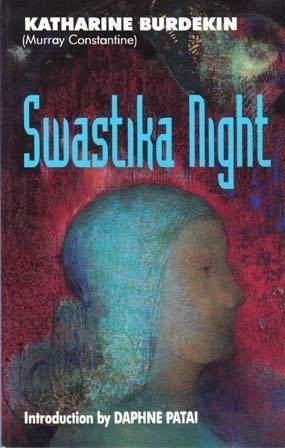
Swastika Night
Book Description
A world gripped by oppression, where women are subjugated and the darkness of tyranny reigns—this is the chilling landscape of 'Swastika Night.' As Nazi ideology shapes reality, hope flickers in the bond between the bold figure of a woman and a disillusioned soldier. Mysterious whispers of rebellion grow louder, igniting fierce conflict and stirring desire. In a society steeped in fear, can love conquer hate? As shadows of the regime loom large, the stakes rise, unraveling a tale of defiance and survival. Will they dare to challenge the demonic status quo, or will they be crushed beneath its weight?
Quick Book Summary
"Swastika Night" by Katharine Burdekin is a disturbing dystopian novel set seven centuries after the Nazis' ultimate victory. In this imagined future, the world is dominated by a Nazi empire where history has been rewritten, Christianity is eradicated, and women are reduced to voiceless, subhuman breeding stock. The story follows Alfred, an English mechanic, who discovers secret truths about the fabricated past from a dissident German knight, Von Hess. As they piece together suppressed memories of the past, the men face the regime's wrath while grappling with the moral implications of their discoveries. The narrative explores the resilience of hope amid suffocating oppression, the gendered dimensions of totalitarian control, and the perils of worshipping a distorted history. Ultimately, "Swastika Night" poses haunting questions about memory, power, and the indomitable human spirit under tyranny.
Summary of Key Ideas
Table of Contents
Totalitarianism and Historical Revisionism
Set in a post-Nazi victory world, "Swastika Night" exposes the consequences of totalitarian rule taken to its extreme. Society is strictly stratified, with Nazism as the sole religion. The German race is revered, and Adolf Hitler is deified, remembered as a towering, god-like figure. History has been manipulated: Nazi doctrine has erased facts about the past, molding collective memory to fit its violent dogma. In this reality, power is maintained through suppressing knowledge and forbidding even the smallest deviations from official narratives.
Patriarchy and the Subjugation of Women
Central to the dystopia is the merciless subjugation of women. Women have no rights or autonomy, reduced to the status of breeding animals, kept separate from men and stripped of names or individuality. Men see women as inferior, and misogyny is institutionalized, ensuring the persistence of the Nazi regime and its gender hierarchy. The book vividly portrays how patriarchy and fascism intersect to oppress women on both systemic and personal levels, warning against the unchecked confluence of political and gender tyranny.
Religion, Myth, and Manufactured Ideology
Religion, as previously known to civilization, is replaced by a cult-like worship of Hitler and Nazi mythos. All other religious beliefs are condemned and destroyed. The Nazis have constructed pseudo-sacred rituals around Hitler’s memory, transforming political ideology into a faith that rules all aspects of life. This manufactured spirituality perpetuates the regime’s grip on power, exemplifying the dangers of using religion to legitimate oppression and manipulate society.
Rebellion, Memory, and the Seeds of Hope
Within this nightmarish world, Alfred and Von Hess emerge as central figures of resistance. Alfred learns forbidden truths from Von Hess, who possesses a secret book chronicling the real history of the Nazis and their genocidal rise. Their clandestine bond symbolizes the transmission of hope through knowledge and memory. Although surrounded by danger, their act of questioning the status quo—and their dream of something better—sows the seeds for future rebellion. The fragile link between memory and hope, as well as the persistence of critical thought, becomes the novel’s central motif.
"Swastika Night" ultimately serves as a warning against fascism, misogyny, and the erasure of history. Through its harrowing vision, Burdekin’s novel challenges readers to confront the ease with which truth can be subverted and humanity degraded under totalitarian control. Yet, the story also offers a glimmer of resistance: by remembering and questioning, even small acts of defiance can inspire the possibility of liberation. The novel endures as a powerful critique of fascist ideologies and a feminist call to preserve truth and dignity in the face of oppression.
Download This Summary
Get a free PDF of this summary instantly — no email required.





